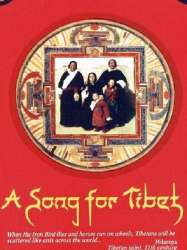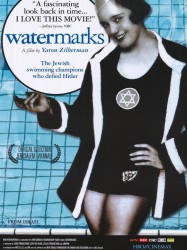Blindsight est un film Britannique de genre Documentaire
Blindsight (2006)

Si vous aimez ce film, faites-le savoir !
- Infos
- Casting
- Infos techniques
- Photos
- Vidéos
- Passages TV
- Citations
- Personnages
- Musique
- Récompenses
Durée 1h44
OrigineRoyaume-uni
Genres Documentaire
Themes L'enfance, Religion, Sport, Le Tibet, Documentaire sur le sport, Documentaire sur une personnalité, Documentaire sur la religion, Le handicap, Bouddhisme
Note71%










Blindsight is a 2006 documentary film directed by Lucy Walker and produced by Sybil Robson Orr for Robson Entertainment. It premiered at 2006 Toronto International Film Festival (TIFF) in the category Real to Reel.
Set against the breathtaking backdrop of the Himalayas, Blindsight follows six Tibetan teenagers on their journey to climb the 23,000 foot Lhakpa Ri mountain in the shadow of Mount Everest. A dangerous journey soon becomes a seemingly impossible challenge made all the more remarkable by the fact that the teenagers are blind. The children are at times feared by their parents, scorned by villagers and deemed sinners by devout followers of Buddhism, and believed to be cursed. Helped by Sabriye Tenberken — a blind German social worker who established the first school for the blind in Lhasa — the students invite the famous blind mountain climber Erik Weihenmayer to visit their school after learning about his climb to the summit of Everest. Erik arrives in Lhasa and helps the students and their educators climb higher than they have ever been before.
Commentaires
Postez un commentaire :
Suggestions de films similaires à Blindsight
Il y a 8968 ayant les mêmes genres cinématographiques, 12142 films qui ont les mêmes thèmes (dont 0 films qui ont les mêmes 9 thèmes que Blindsight), pour avoir au final 70 suggestions de films similaires.Si vous avez aimé Blindsight, vous aimerez sûrement les films similaires suivants :

Det forbudte landshold (2003)
Origine Danemark
Genres Documentaire
Thèmes Religion, Sport, Le Tibet, Documentaire sur le sport, Football, Documentaire sur la religion, Bouddhisme
Note73%





The documentary film was shot at the preamble to the football international match of June 30, 2000, between Tibet and Greenland. For the Tibetans in exile this was the first international match after many decades since the former national team had broke up.
 , 1h31
, 1h31Origine Etats-Unis
Genres Documentaire
Thèmes Religion, Sport, Baseball, Documentaire sur le sport, Documentaire sur une personnalité, Documentaire sur la religion, Religion juive
Acteurs Dustin Hoffman
Note72%





The film was written by Pulitzer Prize winner Ira Berkow, and narrated by actor Dustin Hoffman. It was directed by Peter Miller, a documentary filmmaker known for his previous films A Class Apart, Sacco and Vanzetti, and The Internationale.

Le Tibet : chant d'exil (1991)
, 57minutesOrigine Canada
Genres Documentaire
Thèmes Film sur un écrivain, L'immigration, Religion, Le Tibet, Documentaire sur le droit, Documentaire sur une personnalité, Documentaire sur la politique, Documentaire sur la religion, Politique, Bouddhisme
Note72%






Buddha's Lost Children (2006)
, 1h37Genres Documentaire
Thèmes L'enfance, Religion, Documentaire sur une personnalité, Documentaire sur la religion, Bouddhisme
Note77%






Tulku (2012)
, 1h15Réalisé par Gesar Mukpo
Origine Canada
Genres Documentaire
Thèmes Religion, Le Tibet, Documentaire sur une personnalité, Documentaire sur la religion, Bouddhisme
Acteurs Gesar Mukpo
Note69%





Gesar Mukpo begins by interviewing a fellow Canadian, Dylan Henderson, who was the first Caucasian tulku discovered in the West, recognized in 1975 by Chögyam Trungpa Rinpoche as the incarnation of one of his teachers. The identification was confirmed by Rangjung Rigpe Dorje, the 16th Karmapa, who requested that Henderson come to the Rumtek Monastery in India for the rest of his life. Chögyam Trungpa, however, recommended that he remain in the West. Henderson maintains his Buddhist studies and practices, but without the form and structure present in the East. He has a degree in anthropology and history.
 , 1h25
, 1h25Origine Etats-Unis
Genres Documentaire
Thèmes Film sur un écrivain, Religion, Le Tibet, Documentaire sur une personnalité, Documentaire sur la religion, Bouddhisme
Note73%





Le film commence avec une chronique du voyage de Rick Ray à travers l'Inde pour interviewer Tenzin Gyatso. Le film alterne entre le présent et le passé récent, introduisant des moments consacrés à l'histoire personnelle de Tenzin Gyatso, le processus de désignation d'un dalaï-lama et son voyage en exil.

Même pas peur (2012)
, 25minutesRéalisé par Willem Baptist
Origine Pays-bas
Genres Documentaire
Thèmes L'enfance, Sport, Documentaire sur le sport, Documentaire sur une personnalité, Le handicap
Note74%





Le film raconte l'histoire d'un enfant de neuf ans, Mack Bouwense, qui, malgré une anomalie cardiaque (situs inversus), veut devenir champion de motocross.

Praying With Lior (2008)
, 1h27Origine Royaume-uni
Genres Documentaire
Thèmes L'enfance, Religion, Documentaire sur une personnalité, Documentaire sur la religion, Le handicap, Religion juive
Note73%






Dalai Lama Renaissance (2007)
Réalisé par Khashyar Darvich
Origine Etats-Unis
Genres Documentaire
Thèmes Film sur un écrivain, Religion, Le Tibet, Documentaire sur une personnalité, Documentaire sur la religion, Bouddhisme
Acteurs Harrison Ford
Note66%






Watermarks (2004)
, 1h20Genres Documentaire, Historique
Thèmes Le racisme, Religion, Sport, Documentaire sur le sport, Documentaire sur la discrimination, Documentaire sur le droit, Documentaire historique, Documentaire sur une personnalité, Documentaire sur la religion, Religion juive
Note71%





L’Hakoah (« La force » en hébreu), fut fondé à Vienne en 1909, par réaction au célèbre paragraphe aryen qui interdisait aux clubs de sport autrichiens d’intégrer des athlètes juifs et devint l’un des plus grands clubs de sport de l’Europe de l’entre deux guerres. Dans les années 30, les plus grands succès de l’Hakoah furent remportés par ses nageuses, qui dominaient la compétition nationale en Autriche. Après l’Anschluss, les Nazis ont fait fermer le club. Les nageuses réussirent à fuir le pays avant que la guerre n’éclate, grâce à une opération de sauvetage organisée par les sportifs de l’Hakoah. 65 ans plus tard, 7 membres de l’équipe féminine de natation se retrouvent dans leur ancienne piscine à Vienne, un voyage qui évoque à la fois les souvenirs de leurs jeunes années, leur féminité affirmer et qui leur permet de renouer les liens de toute une vie.
 Connexion
Connexion